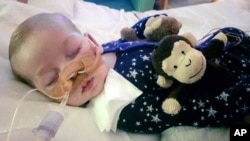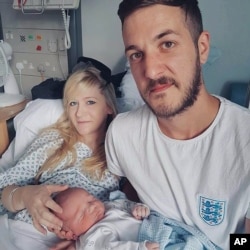The British High Court ordered terminally ill infant, Charlie Gard, to be moved to a hospice facility to die, ending a case that has spurred debate over the role of the state in children's rights and health care.
The decision was made Thursday after Charlie's parents and Great Ormond Street Hospital in London, where he is being treated, failed to agree on an end-of-life care plan for the 11-month-old. If no further agreement is reached, Charlie will be moved to Hospice on Friday in accordance with the hospital's plan. The life-support systems would be removed shortly after, "inevitably result[ing] in Charlie's death within a short period of time," according to the judge.
"It is not in Charlie's best interests for artificial ventilation to continue to be provided to him, and it is therefore lawful and in his best interests for it to be withdrawn," the court order said.
Charlie was born with a rare genetic disease called encephalomyopathic mitochondrial DNA depletion syndrome - one of only 16 confirmed cases worldwide. He cannot see or hear, he cannot move or breathe, he cannot cry or swallow, he suffers from frequent epileptic seizures. He would turn one year old on August 4.
Earlier this year, the hospital treating Charlie asked for court permission to remove him from life support, saying that keeping him alive was merely causing more suffering. The parents, Chris Gard and Connie Yates, disagreed and asked for permission to take Charlie to the United States for experimental treatment. The British courts and the European Court of Human Rights all backed the hospital.
The Court of Human Rights argued that "undergoing experimental treatment with no prospects of success would offer no benefit, and continue to cause [Charlie] significant harm."
The case drew pitched coverage from British tabloids and captured worldwide attention after world leaders like President Donald Trump and Pope Francis weighed in, offering medical support.
Earlier this week, Gard and Yates abandoned their months-long legal fight, acknowledging the illness was untreatable.
They then asked to take their son home to die, a request the hospital denied. According to the hospital, the "invasive ventilation" that Charlie required was only available in the hospital. The machines would not fit into the family's home in London.
Under British law, children hold rights independent of their parents, meaning the parents do not always have the absolute right to make medical decisions for their children. Great Ormond Street Hospital released a statement expressing regret over the public disagreement.
"We deeply regret that profound and heartfelt differences between Charlie's doctors and his parents have had to be played out in court over such a protracted period," the statement read. "While we always respect parents' views, we will never do anything that could cause our patients unnecessary and prolonged suffering. The priority of our medical staff has always been Charlie."







